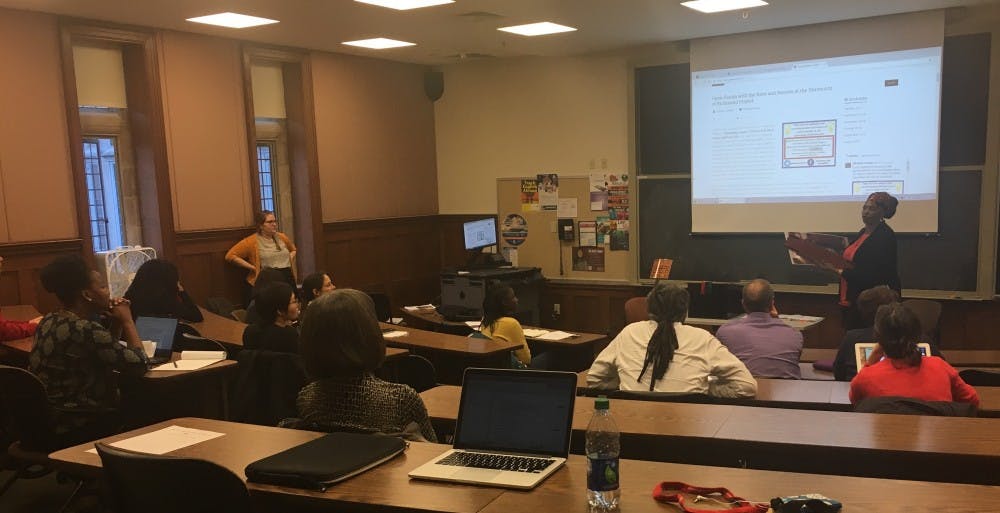How do we decide what is remembered and what's not?
Students in the rhetoric class “Digital Memory & The Archive” spent the fall semester trying to answer that question in the context of the University of Richmond’s archival evidence of race and gender relations.
The class is a part of the Race and Racism Project at the University of Richmond, which was founded in the Fall of 2015. The class is led by Irina Rogova, archivist for the Race and Racism project.
Rogova’s class focused on the period between 1964, the year the Civil Rights Act was passed, and 1986, the last year of E. Bruce Heilman’s tenure as president of UR.
“In our journey to discuss and expand upon existing research, the class had the chance to engage with various different primary sources, primarily The Collegian, the campus newspaper, and unpublished materials from the University of Richmond Archive,” the class website states.
Over the course of the semester, the class compiled a timeline, podcast and two exhibits about their findings. They also contributed 15 blog posts to the project’s website and completed more than 150 metadata entries.
Before break, the class presented their reflections on their findings and the research process in Weinstein Hall’s Brown-Alley Room. Most of the students’ comments throughout the presentations illustrated surprise at UR’s initial reluctance to integrate the campus.
“It took a lot of time for the university to actually comply with the Civil Rights Act,” Vishwesh Mehta, a senior in the class, said.
Mehta and his group compiled the timeline detailing UR's diversity initiatives throughout the 22-year period. They said the chronological display had helped them notice how long it had taken for change to happen on campus.
Other groups searched the archives for information about the first black athletes at UR, the university’s reaction to the federal Title IX statute and the difference between student efforts and administrative efforts to diversify campus.
Their research included finding and talking to the first black baseball player at UR, discovering that UR did not fully comply with Title IX standards until 1996 and synthesizing that many of the initial efforts to integrate the school came from the students.
Rogova said that uncovering this history first-hand through primary sources was difficult, but it helped students see through the language and analyze what the text really said.
Enjoy what you're reading?
Signup for our newsletter
“It is a lot more interactive than any normal paper,” Julia Marcellino, senior, said of the research process. “It forced us to really examine the content and it fostered creativity when putting together our exhibit.”
The project came out of students’ questions about UR's history of racial integration, Rogova said, and has developed into an important examination of this history. Rogova said that one of the most important aspects of the project went beyond the texts.
“Just giving students from a variety of backgrounds something to hold on to,” Rogova said. “That’s important today, in not exactly the greatest times.”
While the texts that the class was able to find were informative, the students said they were far from comprehensive.
“Our understanding of this subject is still really incomplete,” Tegan Helms, senior, said. “Until the university is really straightforward in their archives, there will always be gaps.”
Destiny Riley, junior, shared these sentiments.
“I hope in the future, there will be more honesty about the student demographics and dynamics on campus,” Riley said.
In addition to uncovering and documenting the past, the Race and Racism Project’s mission is to analyze the texts and “illuminate dimensions of the University of Richmond’s racial history.”
Rogova and her class hope that their exhibits and podcasts will serve as that analysis and will inspire future action.
“We hope that people look at this and use it as a tool to move forward,” Mehta said.
“As long as people don’t know our history, then no action or change will be made on campus,” Anna Lowenthal, junior, said.
The class’ exhibits and more information about the Race and Racism Project can be found here.
Contact copy editor and contributor Jake Wood at james.wood@richmond.edu.
Support independent student media
You can make a tax-deductible donation by clicking the button below, which takes you to our secure PayPal account. The page is set up to receive contributions in whatever amount you designate. We look forward to using the money we raise to further our mission of providing honest and accurate information to students, faculty, staff, alumni and others in the general public.
Donate Now



